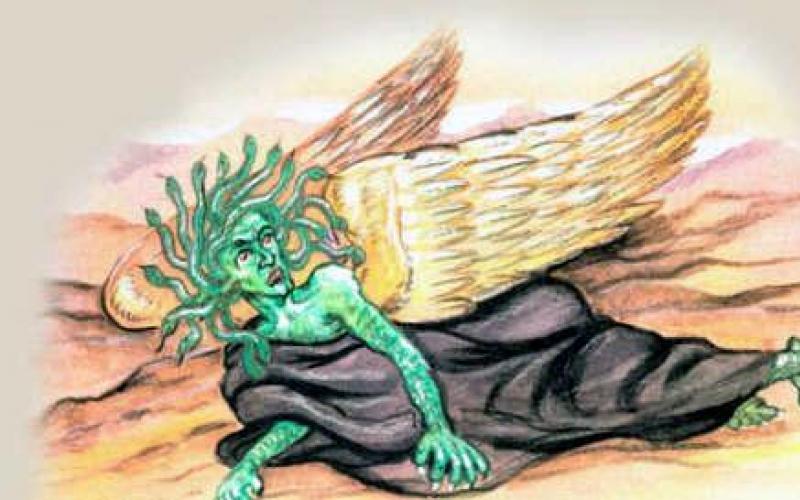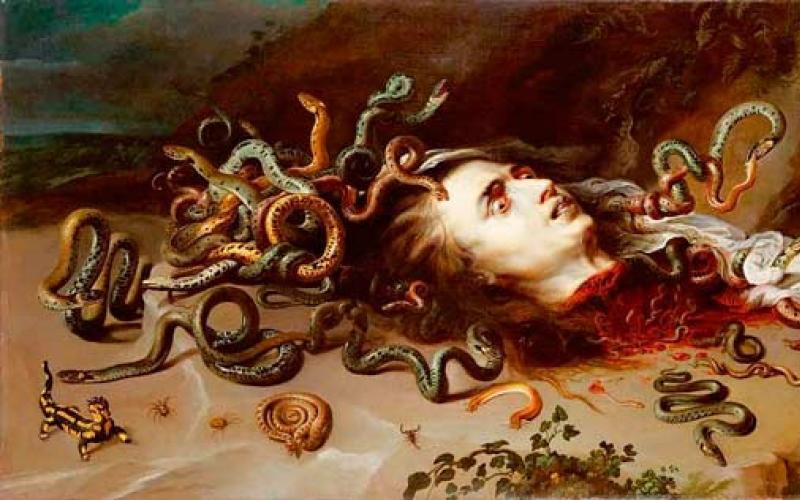In the history of language development, periods of turbulent and extensive change may be followed by periods of relative calm. In the process of development, the language changes not only under the influence of linguistic laws and changes, but also due to changes in the social life of the language community. So sharing history in English for chronological periods, domestic researchers take into account both linguistic and extralinguistic aspects.
The boundaries between the periods of development of the English language are associated with historical events that influenced the language.
According to this approach, the history of the English language is divided into the following periods:
- 1. Old English period.
- 2. Middle English period.
- 3. New English period.
I. Old English - begins with the conquest of Britain by the Germanic tribes (5th century AD); ends with the Norman Conquest (1066).
Covers the period from the 5th-7th centuries. until the end of the 11th century. AD;
In the Old English period of development, the English language (7th-11th centuries; called the Anglo-Saxon language) is represented by 4 dialects; Northumbrian, Mercian, Wessex and Kentish. A significant number of Latinisms in the Old English vocabulary was the result of the penetration of Christianity into England (from the 6th century), as well as translations from the Latin language of the works of various authors. From the language of the Celtic population of Britain, it is mainly place names that have survived.
Scandinavian raids (from the end of the 8th century), ending with the subjugation of England in 1016 dates. king, and the creation of scand. settlements led to the interaction of closely related languages - English and Scandinavian, which affected the presence in modern English of a significant number of words of Scandinavian origin and contributed to the strengthening of a number of grammatical trends that existed in Old English.
The conquest of England by the Normans in 1066 led to a long period of bilingualism: French functioned as the official language, and English continued to be used (having 3 main dialect zones in the 12th-15th centuries - northern, central and southern) as the language of the common people. The prolonged use of the French language in England led to the fact that, after its displacement from the official sphere, by the 14th century. extensive layers of French vocabulary continue to be preserved in the English language.
Although Old English was not as highly inflectional as Sanskrit, Ancient Greek or Latin, it had a complex system of declensions and conjugations. Because nouns retained case endings, many relationships could be expressed without the help of prepositions, unlike modern English.
II. Middle English - begins with the Norman conquest and continues until the end of the 15th century. In 1485 the Wars of the Roses ended, which meant the decline of feudalism and the emergence of capitalism in England; these events also influenced the development of the English language. In the 15th century book printing appeared (1475), which was an important event in social and linguistic terms. The Middle English period is subdivided into Early Middle English (12th-13th centuries) and Late Middle English (14th-15th centuries).
The Middle English period of the development of English (12th-15th centuries; sometimes called Middle English) is characterized by phonetic and grammatical changes that sharply demarcate Middle English from the Old English period. The reduction of unstressed vowels led to a significant simplification of the morphological structure, and on the basis of the grammatization of verb phrases, new system verb paradigms. In the 16-17 centuries. the so-called early modern English language.
Typography (1476) and the popularity of the works of J. Chaucer (1340-1400), who wrote in the London dialect, contributed to the consolidation and spread of London forms. However, typography recorded some traditional spellings that did not reflect the pronunciation norms of the late 15th century. The discrepancy between pronunciation and spelling, characteristic of modern English, began. With development literary language system expanded and became more complex. functional styles, there was a demarcation of the forms of spoken and written speech, the codification of literary norms. An important role in the development of the literary language was played by direct and indirect linguistic contacts of the English language with other languages, associated with the spread of the English language outside of England. The latter led to the formation of literary English variants in the United States, Canada and Australia, which differ from literary English mainly in pronunciation and vocabulary.
III. Modern English - begins around 1500 and continues to this day. This period is usually divided into early modern English (1500-1700) and modern English proper (from 1700 to the present day).
The fifteenth century, unproductive in terms of literary achievement, was a period of important and productive linguistic changes, both in terms of word forms and sentence structure. With the loss of inflections, word order took on more importance than it did in Old and Middle English.
The development of the language in the 15th century. Other factors also contributed, notably the invention of printing and the revival of classical learning. These powerful factors came into play just at the time when the English language had reached a certain stability in its development, moving along the path to maturity. The appearance of typesetting typographic fonts led to a wider and faster spread of literature and culture, and the revival of ancient Greek science favored a deeper and more versatile knowledge of man and his place in the universe.
At the same time, the Renaissance of the 16th century. favored extensive borrowing of Latin words.
In the complex system of verb tenses, which gradually replaced the binary tense system of the Old English language, which originally expressed the idea of time as a contrast between the present-future tense and the past, two important changes are seen. The first is the increasing use of extended forms such as I am eating(I eat (at the moment) through simple forms like I eat(I eat (in general). This change stems from the desire to make the action described by the verb more lively and realistic - and in this it differs from other modern trends in the language, in general, striving for greater economy and brevity of linguistic expression. The second change consists in more wide use of extended forms of the verb go "to go" to convey the near future, as in saying We are going to write(We will now write) instead of We will write(We will write). Verb go, which previously meant walk(to walk), as in Bunyan's Pilgrim's Way: "I have resolved to run when I can, to go when I cannot run, and to creep when I cannot go."(I resolved to run as long as I could; to walk when I could not run, and to crawl when I could not walk.) is now so devoid of its former material meaning that it can be used as an auxiliary verb with itself, as in the expression: We are going to go a long way.(We are going to go a long way).
Another distinctive feature of modern English is the increasing use of phrasal verbs in the function of nouns: comeback(return to a previous state or position), setback(rollback; relapse) comedown(degradation, loss of dignity or social position), build up(power building; flattery) follow up(follow-up; additional information), hold-up(robbery; congestion) leading(introduction, intro) input(contribution, input), etc. These words are often preferred over their Classical and Romance synonyms because, by virtue of their brevity, they seem more vivid and persuasive. In all spheres of life - both in newspaper headlines and in everyday speech - monosyllabic words are largely preferred: jet instead of jet-propelled aircraft(reactive plane), op instead of operation(operation), up instead of promote(stimulate, promote). A variety of abbreviations also meet the needs of the modern world, whether they are easy-to-pronounce abbreviations like ERNIE (Electronic Random Number Indicator Equipment- electronic indicator of random numbers"), or unpronounceable, such as, DSIR (Department of Scientific and Industrial Research- department of scientific and industrial developments). Despite the standardizing influence that the school, radio, film and television have, the various speech levels - oratory, literary, colloquial, colloquial and slang - continue to enrich each other and improve the language as a whole. Today, slang is in use more than ever, but many slang neoplasms do not linger in the language, turning out to be one-day: of the slang neoplasms, only an insignificant number of the chosen ones fall into the level of the commonly used colloquial language.
Modern English has a large number of territorial dialects: in the UK - the Scottish dialect, a group of northern, central (east-central, west-central), southern and southwestern dialects; in the USA - East English, mid-Atlantic (central), southeastern, mid-western groups. The dialectal variation of the English language in the UK is much more pronounced than in the USA, where the central dialect becomes the basis of the literary norm.
The phonetic structure of the English language is characterized by the presence of specific vowels, consonants, the absence of a sharp border between diphthongs and long monophthongs.
DIAGRAM 1. The influence of different cultures on the formation of the English language.
Among other Germanic languages, English is distinguished by the presence of a bright pronounced signs analytical system: the main means of expressing grammatical relations are service words (prepositions, auxiliary verbs) and word order. Analytical forms are used to express some species-temporal relations, to form degrees of comparison of adjectives. Case relations are conveyed by the position of words in a sentence and by prepositional constructions. fixed word order is one of the main means of expressing syntactic links in sentence structure.
In English, non-affix word production (conversion) is widely used. The vocabulary has a high proportion of borrowings (about 70% of the vocabulary), among which a large group is formed by words and affixes borrowed from French and Latin, partly from Italian and Spanish. Literary English was based on the language of London, the dialect base of which at an early stage in the formation of the literary language changed due to displacement in the 2nd half of the 13th - 1st half of the 14th centuries. southern dialect forms east-central.
All these events happened in the first 16 years of my life. After that, nothing particularly excited me ...
Children think a lot about life, but know very little about it. Therefore, they have much more in their heads than they see or can ask. That is, their inner world is much larger and richer than the outer.
1. Once I stole a typewriter from a friend. I couldn't play it. He began to suffer terribly. Mom found out about this and advised me to call the parents of that boy. The shame was monstrous, the very thought of calling was unbearable, but I made up my mind. Then I realized that courageous deeds are harder to do than shameful ones, but they make you stronger ...
2. When I was little, I considered myself very smart. At least, it was difficult for me to imagine a smarter person, except perhaps for a few adults. This feeling passed when I read Tolstoy's Childhood. Adolescence. Youth". I was struck that the writer recalls the same thing and in the same words about himself. Around the same time, I learned about the infinity of the universe. Then I realized how many small inner worlds there are and what an inexplicable Big world they form...
3. One day I went to a pioneer camp because I was in love with a pioneer leader. Before that, I was in the camp only once, but I escaped, Here I was appointed as a standard-bearer. I really liked the white gloves, the red ribbon over the shoulder and the cap, but it turned out that at the end of the banner transfer ceremony, he would have to be kissed. It seemed a little unnatural to me, especially since by that time I had never kissed. In general, the appointment did not take place. Also, I didn't have a social life, I didn't like the candle game, and I never learned to play the drum. I did nothing wrong, but the activists hated me. I had to leave again. Then I realized that even if you good man It doesn't mean that everyone will love you...
4. One day my friends and I were sitting in the school locker room after school. An elementary school teacher passed by, who thought we were picking pockets. Trial has begun. The case of theft was announced on parent meeting. It was impossible to make excuses, even the parents began to doubt. Before that, I had to lie, but, as a rule, unsuccessfully. Therefore, the power and authority of truth were invincible for me. But then I realized that even if you are right, this does not mean at all that they will believe you. It turned out that one must fight for the truth ...
5. Once, on a cultural exchange program, my class and I went to Hungary. Abroad shocked everyone. My Hungarian had a wine cellar in his house, and for lunch they ate cherry soup. Our peers rode the girls on their own motorcycles, drank wine and walked at night. A friendly football match took place between us. Girls, of course, were fans. In a word, you will not see such battles! Borodino faded before this battle. It was imperative to win. And we won. Then I realized something about patriotism...
6. In youth, physical strength and a sense of justice mean a lot. That's why I fought a lot at school. At the age of 16, I broke my classmate's nose. In principle, as the investigator explained, this was considered a serious bodily injury. But after interrogation, he promised not to start a case, but offered to inform him about cases of theft and distribution of pornography at school and left the phone. The paper had to be thrown out in the corridor, as the victim was eavesdropping at the door. Then I realized that dignity should always be stronger than fear ...
7. The first parting with a loved one is never easy. I also had a hard time experiencing this moment until I sat down at the table and wrote a heartfelt lyrical story about a submarine officer. When the end was put on paper at four in the morning, I was well and went to bed. Then I realized that art is a great power...
8. And the last. Even as a child, I was struck by the difference between a man and a woman. This shock has not yet passed.
During its history, the world has experienced many different events that have changed it and influenced the course of history. If they don't happen, our modern world would be completely different now. But history decreed otherwise.
Events that influenced the course of world history
Many researchers consider such events to be turning points in world history. Let's take a closer look at the ten most important of them.
1. The invention of the wheel. Surprisingly, it was his appearance that became the starting point for the rapid development of cities, agriculture and population growth. Appearing as early as the third millennium BC, it made it possible to more efficiently transport crops to cities, hunger ceased to threaten humanity, and the population began to increase. Thanks to the circular movement, namely flywheels and blocks, it became possible to lift heavy stones, construction began to develop rapidly.
2. plague epidemic. In less than seven months, the population Western Europe almost halved, causing irreparable damage to the socio-economic structure of countries. The feudal system suffered a blow from which it could not recover. At the same time, people's views on such concepts as illness, death, and faith in God have changed a lot.
3. Discovery of America made Christopher Columbus one of the key figures in history. Thanks to him, people learned that there are other unknown lands, although before that everyone relied on the geographical representations of the ancient Greeks. Columbus made the greatest discovery, which completely changed people's perception of the world, not thanks to the latest technologies at that time, but only with the help of a compass, which was invented three centuries earlier.
4. scientific revolution. XVI-XVII centuries were marked by rampant inquisition. Thousands of innocent people were burned at the stake for "connection with the devil and witchcraft." And only in the 17th century it was possible to partially dispel superstitions, because scientists appeared who, with great difficulty, and sometimes at the cost of their own lives, gave the world new knowledge.

5. The advent of electricity. Electricity just became the fruit of scientific research, although it was known about even in Ancient Greece. But by historical standards, it was invented and rethought not so long ago, only 200 years ago, and, as usual, faced with an active rejection of the church, and now we cannot imagine our life without it.
6. Vaccine. This invention has saved millions of human lives and continues to do so to this day. Now it is difficult to imagine our world, if not for the invention of Louis Pasteur. Thanks to him, we know about terrible diseases only from history.
7. First World War . The 19-year-old Serbian high school student Gavrila Princip did not even suspect that his lone shot in Sarajevo would lead to a complete reorganization of the world - four empires disappeared from the map of Europe at once, dozens of new states appeared in their place, tens of millions of dead remained on the battlefields, no less Wounded, and casualties among the civilian population turned out to be at least 50 million people. There was a catastrophic drop in living standards everywhere. During these years, European fascism was born, which in the future will become another bloody page in world history.
8. The Second World War. Many states were involved in it - again millions of dead, cities destroyed, wiped off the face of the Earth, terrible crimes against humanity, which the world had not known before. Terrible weapons of mass destruction have been invented.
9. Atomic bomb . Her invention and tests have shown humanity that it can disappear from the face of the Earth in a matter of minutes. The world shuddered and thought about tomorrow. Since then, humanity has repeatedly found itself on the verge of an atomic war, but so far wisdom has prevailed.
10. Space exploration- a real breakthrough in the history of mankind. Research is still ongoing, we already know a lot of new things, and how many unexpected discoveries are yet to come.

These are, in our opinion, important events world history, thanks to which we now enjoy the benefits of civilization, do not die from terrible diseases, but still rarely think about the fragility of the world.
Guys, we put our soul into the site. Thanks for that
for discovering this beauty. Thanks for the inspiration and goosebumps.
Join us at Facebook and In contact with
As you know, every action has its own consequences - good or bad, one way or another changing the course of life of individuals or of all mankind.
website collected for you events that to varying degrees influenced the course of events.
Prohibition and Caesar salad
July 4, 1924 in a restaurant located in Mexico near the border with the United States, there was a stormy feast. And if there were no problems with alcohol, then the food supplies came to an end. And then the restaurant owner Caesar Cardini had the idea to cook a dish from what they had not yet eaten.
Among the supplies of the resourceful cook, romaine lettuce, wheat bread, parmesan and eggs were found. It is from romaine leaves, croutons, grated parmesan and a sauce consisting of eggs, lemon juice, garlic, Worcester sauce and olive oil, and the first "Caesar" in the world was prepared.
Error in calculations and infection of a vast territory
In 1954, a nuclear bomb was tested in the Bikini Atoll area, the explosion of which became 2.5 times more powerful than the predicted one - 15 megatons instead of the most probable 6.
The mistake was the fault of the bomb designers, who decided that the lithium-7 present in the bomb would be inactive. The result of this monstrous mistake was not only a change in the shape of Bikini Atoll and radioactive contamination of a gigantic territory, but also the death of many people from the consequences of radiation sickness.
Defective wine and Dom Pérignon
In the middle of the 17th century, the Benedictine monk Pierre Pérignon studied ways to remove bubbles from the wine produced in his monastery. According to the monk, it was the bubbles that formed during fermentation that made the wine ignoble, and the barrels of the drink exploded quite often. In order to fix all this, he came up with the idea of bottling wine and plugging them with wooden corks to keep carbon dioxide out.
However, with the coming to power of the regent Philip II of Orleans, who preferred the foamy drink, the entire Parisian court, intent on pleasing the ruler, began to drink it exclusively.
Iñigo de Loyola's wounds and the Jesuit order
In 1521, Iñigo de Loyola participated in the defense of Pamplona and received a serious leg wound. Recovering in the castle after several operations, he asked to bring him chivalric novels, which were not in the local library. Instead, they brought him a work called The Life of Jesus Christ and one volume of the Lives of the Saints.
According to Loyola himself, reading these books opened up an "incomprehensible world" in him, and gradually the brave knight began to immerse himself more and more in religion. After 19 years, Iñigo organized and became the head of the Jesuit order, which played a major role in the revival of the Catholic faith in Europe after the Reformation era.
Construction of a sawmill and the California gold rush
On January 24, 1848, James W. Marshall, manager of the sawmill on the American River, discovered small yellow pebbles in a water wheel. He took the find to his employer, John Sutter, who, after checking them, came to the conclusion that they were pure gold. Despite the fact that Sutter wanted to hide the discovery of gold, very soon the news of this spread throughout the country.
A huge number of people rushed to California, the population of the town of San Francisco increased from 1,000 to 25,000 people in 2 years, the construction of roads, schools and churches began throughout the state. By the way, it was in California in 1853, during the gold rush, that Levi Strauss sewed and sold the world's first jeans.
Revenge and Chips
Surprisingly, chips and jeans appeared in the same year. On August 24, 1853, the chef of the American restaurant Moon's Lake House, George Crum, prepared the usual portion of french fries for one of his customers. However, the visitor did not like the thickness of the sliced potatoes, which he complained to Krum.
The cook got angry, in response, cut the potatoes into slices no thicker than paper and fried them in boiling oil. However, the visitor was overjoyed, and since then a new dish has appeared in the restaurant - Saratoga Chips.
Despite the fact that the recipe for such a dish is mentioned in cookbook 1817 and George Crum is most likely not its inventor, the merit of the popularity of chips, no doubt, belongs to him.
The Wrong Route and the Beginning of World War I
As you know, the reason for the outbreak of the First World War was the assassination of Prince Franz Ferdinand, which occurred in 1914. However, few people know that despite the fact that Gavrilo Princip was one of the conspirators who planned the crime, he managed to kill the prince by chance.
On the morning of July 28, the prince arrived in Sarajevo, and on the way to the city hall, one of the conspirators threw a grenade, which Franz Ferdinand instinctively threw into the crowd of people. After visiting the town hall, he went to visit the victims of the grenade explosion, but the driver was not informed about the change in route.
When the car turned onto Franz Josef Street, along which the prince was driving to the town hall in the morning, she was noticed by Princip standing near the cafe, who actually fired the first shots of the First World War.
Melted chocolate and a revolution in cooking
In 1945, Percy LeBaron Spencer had been working for 20 years on the creation of radars for the American company Raytheon. One day, passing by an installation emitting high-frequency waves, he noticed that the chocolate in his pocket (according to another version, a cheese sandwich) had melted.
Percy was not at a loss and bought dry corn kernels at a nearby store, which the machine immediately turned into popcorn. Then he decided to boil an egg with her help, which exploded safely.
The patent for the first microwave oven, named Radarange, was received on October 8, 1945. After 2 years, the first commercial oven appeared on sale, the “growth” of which reached 180 cm, and the weight was 340 kg. This "unit" cost $ 5,000.
Waste blanks and stainless steel
In 1913, the self-taught English metallurgist Harry Brearley was studying alloys in search of the ideal metal formula for making gun barrels. Unsuccessful, in his opinion, blanks, he simply put in a pile, where they rusted.
One day, Harry noticed that one of the castings made a month ago, unlike the others, did not rust at all. Brearley sent the castings to two manufacturers in Sheffield, where for several centuries there were factories for the production of knives and cutlery, but they were not interested in opening it.
Only a year later, Brearley met a school friend, with whom they came up with a way to process the alloy so that it was not brittle. Already in 1916 they managed to obtain a patent for their invention in the United States.
Tea and the Revolutionary War
On December 16, 1773, an event took place in American Boston that went down in history as the Boston Tea Party. A group calling themselves the "Sons of Liberty" disguised themselves as Indians and, in protest against the "Tea Law" adopted in May, threw 342 boxes of tea into the water, which were in the holds of ships arriving from England.
Despite the already existing disagreements between the North American colonies and Great Britain, historians believe that it was the Boston Tea Party that was the catalyst for the Revolutionary War, which resulted in the formation of the United States of America.
Erased Records and the Moon Landing
According to official data, on July 20, 1969, American astronaut Neil Armstrong was the first to walk on the surface of the moon. According to various rumors that have been circulating around the world since then, all this is a complete hoax and the Americans have never landed on the Earth's satellite.
The rumors were also fueled by the fact that the original footage, capturing the historical moment, was accidentally destroyed by NASA specialists, who released the tapes for new video recordings. Only 4 copies have survived, which were given to various television companies at one time.
In 2009, Hollywood specialists restored the recordings from existing copies, and today they are available to everyone on the NASA website. However, what exactly was restored in Hollywood and whether it was restored at all, given the possibilities modern technologies, we are unlikely to know.








